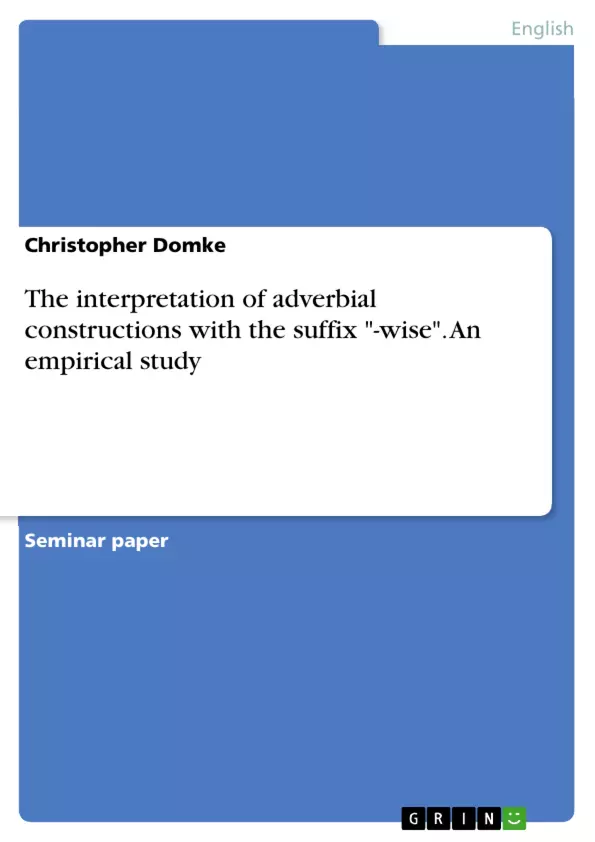The usage of "-wise" as a suffix within adverbial constructions such as in "crabwise" or "weatherwise" has clearly increased over the last decades and became progressively more popular in the mid-twentieth century.
Although it is mostly used in spoken discourse, its usage is not restricted to speech but expands to the
written word as for example in newspapers or scholarly journals. This stems from the fact that this kind of genre quickly picks up new trends.
However, while -wise has been accepted in the adverbial sense, "-wise" as a suffix for new words with the meaning 'with regard to' is criticized.
Table of Contents
- Introduction
- An Empirical Study towards the Interpretation of Adverbial Forms with the Suffix -wise
- Introduction to the Suffix -wise
- Outline and Realization of the Empirical Study
- Interpretation of the Results
- Conclusion and Discussion
- Sources
- Appendix
Objectives and Key Themes
The main objective of this paper is to demonstrate the necessity of contextualization for newly created words ending in the suffix -wise, in contrast to lexicalized constructions with -wise, which have fixed meanings. This will be achieved by analyzing the results of an empirical study examining the interpretations of adverbial forms with the suffix -wise.
- The increasing use of the suffix -wise in modern English, particularly in spoken discourse and written media.
- The ambiguity of newly created words with -wise and the need for contextualization to understand their intended meaning.
- The different interpretations of adverbial forms with -wise, including 'adverb of manner and dimension' and 'viewpoint adverb'.
- The role of lexicalization in determining the interpretability of -wise constructions.
- The impact of pragmatics on the understanding of -wise constructions and their storage in the mental lexicon.
Chapter Summaries
The introduction discusses the increasing use of the suffix -wise in modern English and its potential for ambiguity. It outlines the main goal of the paper, which is to prove the need for contextualization of newly created words with -wise.
Chapter 2.1 provides a detailed overview of the suffix -wise, tracing its origins and discussing its various functions in forming adverbs of manner, dimension, and direction, as well as the 'viewpoint' form. It also highlights the difference between lexicalized and productive forms of -wise constructions.
Chapter 2.2 focuses on the empirical study, explaining its design and execution. It describes the participant group, consisting of non-native English speakers, and discusses the rationale for choosing this specific group. The chapter also outlines the types of -wise constructions included in the study and emphasizes the importance of including both lexicalized and newly created forms to obtain clear results.
Keywords
This paper examines the interpretation and contextualization of adverbial forms with the suffix -wise, focusing on the distinction between lexicalized and newly created constructions. Key themes include the ambiguity of -wise formations, the role of pragmatics in understanding their meaning, and the impact of lexicalization on interpretability. The empirical study analyzes the paraphrases and contextualizations provided by a group of non-native English speakers, exploring the influence of language background and dictionary usage on their interpretations.
Frequently Asked Questions
Why is the suffix "-wise" becoming more popular?
The usage has increased significantly in recent decades, particularly in spoken discourse and media that quickly adopt new linguistic trends.
What is the main criticism regarding the use of "-wise"?
While established uses are accepted, new formations meaning "with regard to" are often criticized for their potential ambiguity.
What is the difference between lexicalized and newly created "-wise" words?
Lexicalized words have fixed meanings, while newly created words require contextualization to be correctly interpreted by the listener or reader.
What are "viewpoint adverbs" in this context?
These are adverbs formed with "-wise" that indicate a specific perspective or domain, such as "weatherwise" or "money-wise".
Who participated in the empirical study?
The study analyzed interpretations and paraphrases provided by a group of non-native English speakers.
- Quote paper
- M.Ed. Christopher Domke (Author), 2016, The interpretation of adverbial constructions with the suffix "-wise". An empirical study, Munich, GRIN Verlag, https://www.grin.com/document/431049



